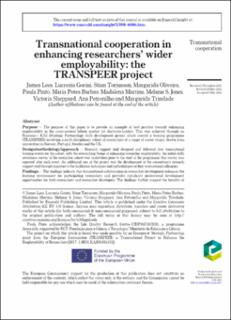Transnational cooperation in enhancing researchers' wider employability: the TRANSPEER project
Lees, James; Gorini, Lucrezia; Torjussen, Stian Sundell; Oliveira, Margarida; Pinto, Paula; Barbas, Maria; Martins, Madalena; Jones, Melanie; Sheppard, Victoria; Petronilho, Ana; Trindade, Margarida
Peer reviewed, Journal article
Published version
Permanent lenke
https://hdl.handle.net/11250/3012020Utgivelsesdato
2022Metadata
Vis full innførselSamlinger
Originalversjon
Studies in Graduate and Postdoctoral Education. 2022 https://doi.org/10.1108/SGPE-12-2021-0083Sammendrag
Purpose: The purpose of this paper is to provide an example of best practice towards enhancing employability in the cross-sectoral labour market for doctorate-holders. This was achieved through an Erasmus+ KA2 (Strategic Partnership) skills development project which created a training programme (TRANSPEER) involving a multi-disciplinary cohort of researchers at a range of career stages, drawn from universities in Norway, Portugal, Sweden and the UK.
Design/methodology/approach: Research support staff designed and delivered four transnational training events for the cohort, with the overarching theme of enhancing researcher employability. An initial skills awareness survey of the researcher cohort was undertaken prior to the start of the programme; this survey was repeated after each event. An additional aim of the project was the development of the consortium’s research support staff through exposure to the facilitation techniques and methodologies of their international colleagues.
Findings: The findings indicate that transnational collaboration in researcher development enhances the learning environment for participating researchers and provides significant professional development opportunities for both researchers and researcher developers. The findings further suggest the benefits of mixing cohorts across career stages and engaging researchers with novel and interactive approaches on themes not typically addressed in academic competence development offerings.
Originality/value: Transversal skills development cooperation between universities – especially transnational cooperation – is rare. Even more so is the professional development of research support staff in a transnational context. This paper outlines the benefits of such collaborative activities.
Beskrivelse
© James Lees, Lucrezia Gorini, Stian Torjussen, Margarida Oliveira, Paula Pinto, Maria Potes Barbas, Madalena Martins, Melanie S. Jones, Victoria Sheppard, Ana Petronilho and Margarida Trindade. Published by Emerald Publishing Limited. This article is published under the Creative Commons Attribution (CC BY 4.0) licence. Anyone may reproduce, distribute, translate and create derivative works of this article (for both commercial & non-commercial purposes), subject to full attribution to the original publication and authors. The full terms of this licence may be seen at http://creativecommons.org/licences/by/4.0/legalcode

